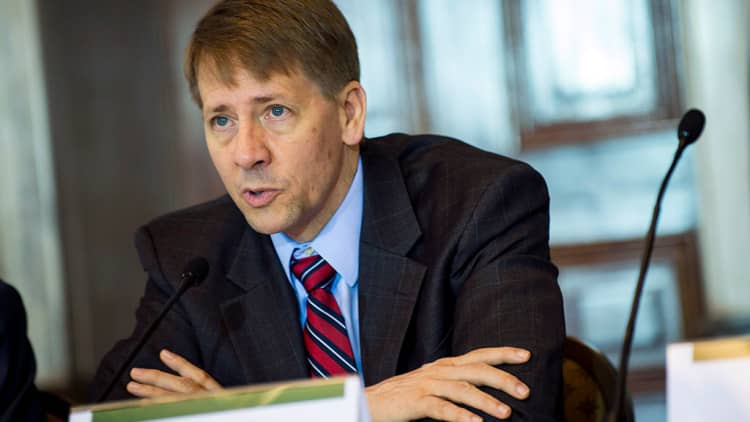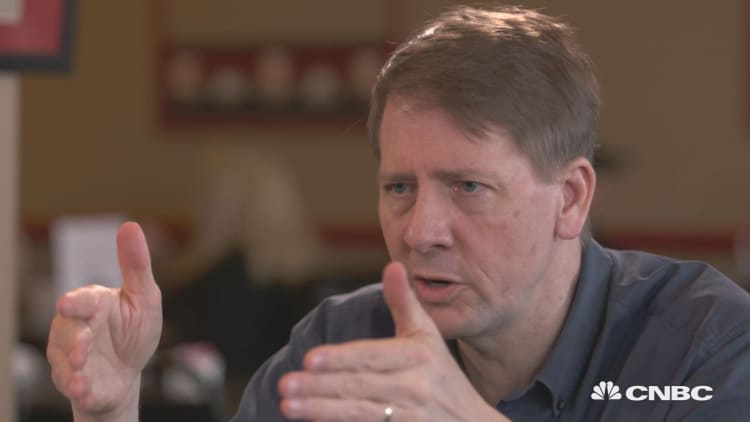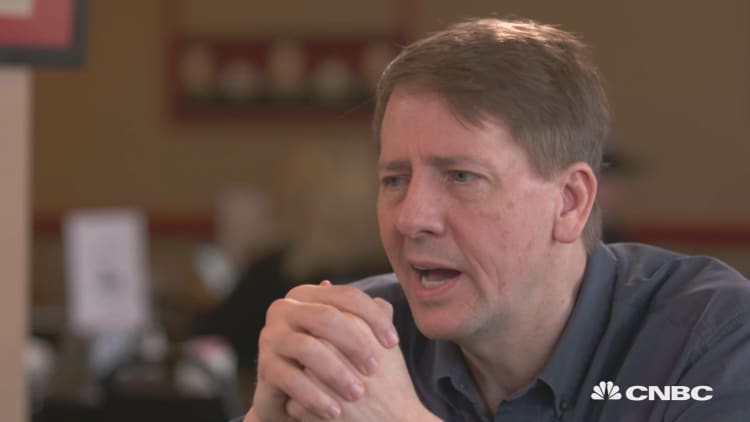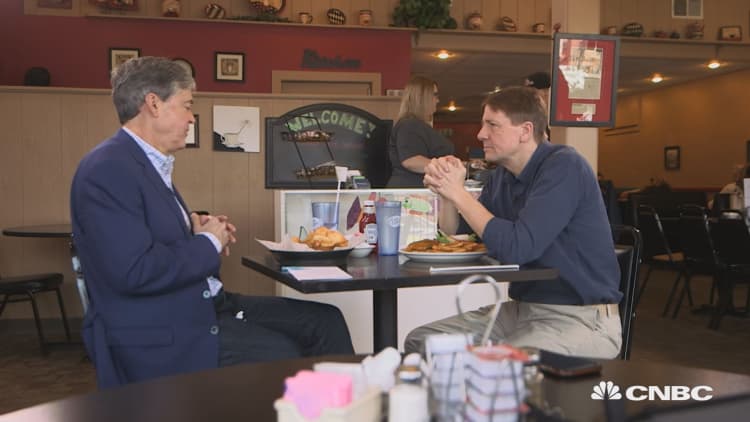
Richard Cordray holds a uniquely awkward position in President Donald Trump's Republican-controlled Washington. He leads the Consumer Finance Protection Bureau created by the Dodd-Frank Wall Street regulation bill signed by President Barack Obama.
With complaints from corporate America urging them on, the White House and congressional Republicans are exploring ways to fire him or curb his power, if not abolish the office altogether. Courts haven't resolved whether Trump has that legal authority.
Meantime, Cordray, 57, continues serving his five-year term, which expires in July 2018, as if the presidential transition never happened.
He scours the financial marketplace for misbehavior like that of Wells Fargo, which CFPB fined $100 million for opening unauthorized accounts in what has become the bureau's signature enforcement action.
The former Ohio attorney general — earlier an undefeated five-time champion on "Jeopardy" — is a potential candidate for governor of that state in 2018.
In a diner in his hometown of Grove City, Cordray discussed the furor around him and his agency. What follows is a condensed, edited transcript of their conversation.
CNBC's John Harwood: Let's play "Jeopardy!" The category is federal regulators, and the clue is biggest target on his back in all of Washington.
Cordray: I don't know how to answer that.
Harwood: Wait, isn't the answer, "Who is Richard Cordray?"
Cordray: It may be. In some ways, it's a mark of respect and appreciation for the fact that we are doing something for people across this country. We're standing up for consumers against large financial companies. That's the job.
Harwood: Do you see what you are doing at CFPB as consistent with the message of Donald Trump and the desires of his voters?
Cordray: I think it's consistent with what most Americans want. What do people do when they're suddenly being harassed by a debt collector, called at all hours of the day and night? Can't get them off their back, can't get them to realize that maybe this debt isn't one that they even owed in the first place. To have somebody who will stand on their side who will try to do something about it. I think people want that.
Harwood: For you personally, is this a job worth fighting for?
Cordray: I think that the independence of a consumer watchdog is very much worth fighting for. It's really important work.
Harwood: What do you expect to happen?
Cordray: Day in day out, I go in and do my job. We have had significant matters in this past year. We had the matter against Wells Fargo where — just to remind your viewers — well over a million accounts were opened where consumers didn't know anything about it, weren't asked for their consent, often it cost them money. That was a major, major violation, and we took action against that.
I think if you're doing things, people will criticize you. But are you going to stop doing things just because you're criticized? You know, and sometimes that's a badge of honor.Richard Cordray
Harwood: Do you think it's fair to say that, in the aftermath of the financial crisis, Washington overreacted?
Cordray: What I would say is that there clearly was not enough done before the crisis. And if you look at the mortgage market, in particular, the lending became completely irresponsible. As long as they could just sell 'em off to Wall Street, it was all OK. That blew up the economy. So, do we want to go back to that? Is that where we want to be? I don't think so. Does the pendulum swing, and swing sometimes too far? Those are things that are legitimate to talk about and people should talk about that.
Harwood: The Wall Street Journal wrote an editorial, said your agency is lawless. Ben Sasse of Nebraska, who is an independent-minded senator, refers to you as King Richard. People say, "He's a dictator." What do you say?
Cordray: First of all, I think it's completely ill-founded. There's never specifics in those kinds of claims. But what I would say is, accountability is really at the heart of this agency. We're all about holding financial companies, large financial companies, accountable for complying with the law and treating people fairly.
Harwood: Do you not accept that you need to be accountable to someone in government who is elected by people?
Cordray: Sure. We are accountable. I have to be accountable to Congress; I have to testify in front of them four times a year. I'm accountable to the courts; they oversee what we do. And if we get something wrong, we fix it, just like everybody else does.
Harwood: Doesn't accountability mean that somebody in government above you can fire you or change your budget?
Cordray: Well, what they can do is replace you from time to time. That's the way the independent agencies work. Nobody's talking about firing Janet Yellen at the Federal Reserve. Nobody's talking about firing other independent agency heads. That's the principle of our government.
Harwood: Part of choices and freedom is people have different options. And so when you say, "No, Payday Lender, you can't make that kind of loan" is a net result of that, is that there are some people who are not going to get things that they want and could use at that moment?
Cordray: What I would say is what we need to do is do the research, look at the data, and understand how these markets work. And there are products in these markets that are in need of reform.
Harwood: And when people say that's what both individual liberty and free enterprise entails, you say what?
Cordray: Common-sense rules of the road that everybody has to abide by can be helpful in a marketplace. If you're driving down the road, you don't simply say, 'Anybody can go anywhere they want. We can move over to the left side if we feel like it today, and we can — we can pass on the berm if we want.'
I have made it clear and I'll make it clear here to you that I'm quite happy to sit down and talk to anybody.Cordray, on a possible meeting with President Trump
Harwood: One of the charges you hear thrown at Trump and his administration from the left is he's an authoritarian. That's exactly what they say about you.
Cordray: Yeah. I think if you're doing things, people will criticize you. But are you going to stop doing things just because you're criticized? You know, and sometimes that's a badge of honor.
Harwood: Do you operate under the notion that the principal impetus for your work is to go after a relatively narrow group of people who abuse consumers? Or do you think that there is a broad propensity for the entire industry to exploit, take advantage, hurt consumers?
Cordray: In virtually every marketplace, there are some players, some participants who are willing to bend the rules and push the envelope to get an advantage, and hope and expect that they won't get caught; and they'll be able to do that. In the debt collection market, for example, there are people who do that. They will harass and abuse and oppress consumers, just to squeeze payments out of them, and hope and expect that if anybody ever tries to hold them accountable, they'll be able to, you know, weasel out of it somehow. I think in other markets there are times where there are market dynamics that make it difficult for people. So, for example, in the lead-up to the crisis, when the mortgage underwriting standards were starting to deteriorate, it became very difficult for community banks and credit unions, in particular, who had standards that they adhered to for years, and suddenly people were coming in asking for loans and they'd say, 'No, we can't make that loan. That won't work.' But they knew they'd go down the street and get it from somebody else. It becomes a very difficult dynamic for them. 'I'm giving up market share, or I have to — I have to lower my standards in a kind of race to the bottom.' And that's where regulation can play a part in upholding basic standards.

Harwood: The reason I ask the question is I do think that some people in business bridle at the idea that Democrats in general, maybe President Obama in particular, people like you, begin with the presumption that people in business have bad motives.
Cordray: I don't begin with the presumption that anybody that I deal with has bad motives — political people, business executives, people in the nonprofit sector, other colleagues in government. I assume good motives on the part of people unless proven otherwise. And for the most part, that makes your interactions more productive.
Harwood: Would you like, by the way, to sit down with the president and explain to him your perspective on your agency?
Cordray: I always enjoy sitting down with anybody to talk about our work and try to explain why I think it's so important. And what I hear from people, I hear in this community and across the country as to how this is helping them and how it's giving them a chance to deal with problems that they sometimes fought for months or for years and never could make any headway. So, yeah, I would love to have that opportunity.
Harwood: Have you talked to anyone senior at the White House about talking to the president?
Cordray: I have not had a chance to talk to the president.
Harwood: People like Reince Priebus, the chief of staff, or Steve Bannon?
Cordray: Well, look. I have made it clear and I'll make it clear here to you that I'm quite happy to sit down and talk to anybody. Love to have the chance to talk to him about our work, hear whatever criticisms or other points of view they may have, and try to talk those through. I think we can reach a lot of common ground in terms of protecting consumers.

Harwood: The president spoke to a lot of people who feel they've been on the wrong side of economic trends and the establishment, the system. Talked about his opponent being too close to Wall Street. And yet he comes into office, he has a director of the National Economic Council who's from Goldman Sachs, and some other people who've worked at these big Wall Street firms. Do you see those two things as necessarily in conflict?
Cordray: I'd rather look at what people actually do. If people are actually going do things that help Main Street then I think that's what we want.
Harwood: What impressions do you draw from what you've seen of this new administration so far?
Cordray: Well, it's only been a month. So, you know, I'd say it's very early. But I think, like I when I first came to Washington and came to work at the Consumer Bureau, Washington's a different place.
I don't think anybody really wants, when they come face-to-face with it, to go back to the days before the financial crisis and the kinds of risks that this economy was running that blew up in our face in the end.Cordray
Harwood: Are you concerned that the work that you've done is going to get wiped out?
Cordray: I don't think anybody really wants, when they come face-to-face with it, to go back to the days before the financial crisis and the kinds of risks that this economy was running that blew up in our face in the end. So, I don't believe that that's likely to occur. But I will say if you care about what you're doing, you care about it. And you worry that later it'll be done differently; you do the best you can and at some point, you know, there's bigger forces in the universe than you and me. That's life.

Harwood: You're in a small group of people who have clerked for two different Supreme Court justices — you and Neil Gorsuch. Tell me how much you've been around him, your observations about what kind of guy he is. He's about to become pretty famous in this country as a result of his Supreme Court nomination.
Cordray: We've met at reunions. The common element for us is we both had two great mentors when we were younger in life. Justice White and Justice Kennedy taught me a lot of lessons that I think I carry into my approach to enforcing the law and respecting the law to this day. And I'm sure that Judge Gorsuch does as well.
Harwood: And what impressions have you drawn of him?
Cordray: I think he is a conscientious, very, very capable judge. I don't mean to get in the middle of any of those deliberations which are for the Senate.
Harwood: Anything that makes you think he shouldn't be on the Supreme Court?
Cordray: I'm not in a position to judge that. But, again, he and I have common elements in our background from having worked for two different justices on the Supreme Court, the same two justices, and learned quite a lot, I'm sure in his case, and certainly was true in my case. And I think that's to his credit.


